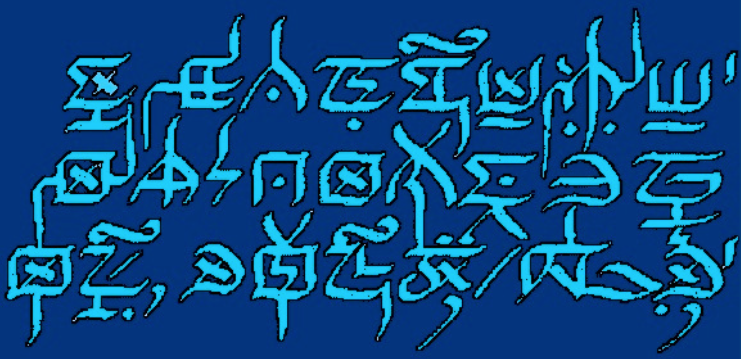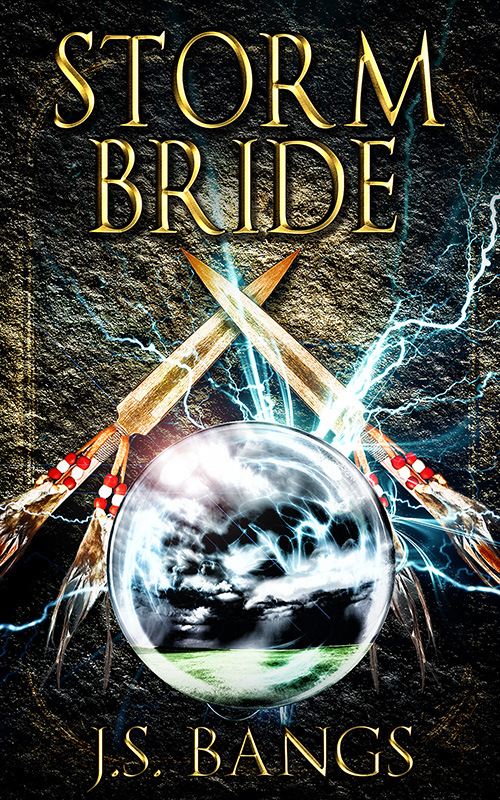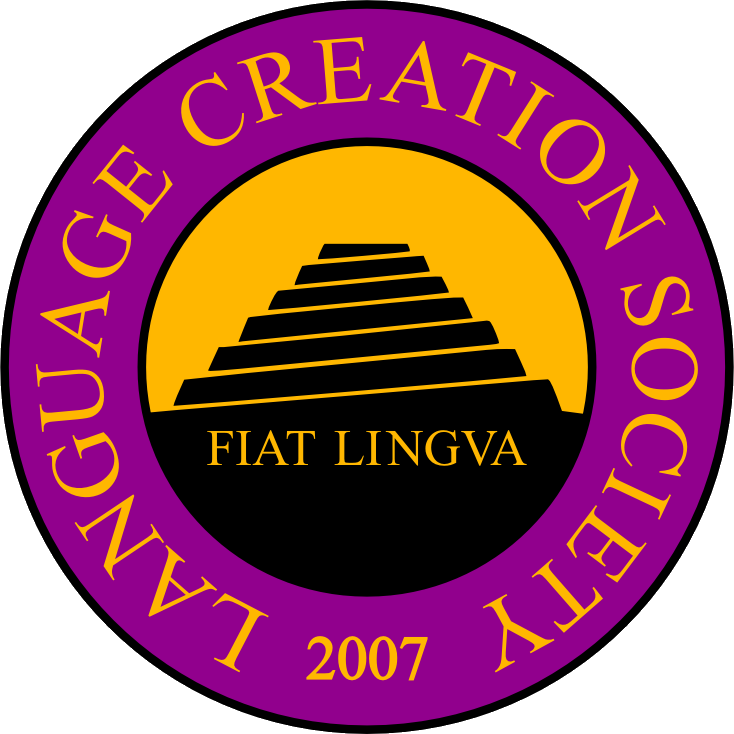Language Creation Tribune
Issue 4
A word from our President
Hello everyone, and welcome to the 4th edition of the Language Creation Tribune. Sorry for the delay (which was mostly my fault, I have to admit), but it’s finally here for you to enjoy! Once again, Jessie, John and the other editors have done a great job in putting it together. And given Jessie’s infinite patience waiting for me to get my column ready, she deserves an extra round of applause!
So, as you already know, the Sixth Language Creation Conference is really going to happen (we’re busy setting up the schedule at the moment). So if you plan to attend but haven’t registered yet, now’s the time to do it! (The registration form is on the LCC6 page.) Also, if you are interested in a giving a talk but haven’t made a proposal yet, there are still slots available in the schedule, so you are welcome to send a proposal to lcc6-talks@nullconlang.org. Because we only have a few slots left, though, make sure you send a proposal as soon as possible!
With information about LCC6 out of the way, I’m going to turn my focus onto another point: As you probably know, it’s now been just over a year since I was elected President of the Language Creation Society (if you don’t, that means you’re a relatively new member of the LCS, and let me use this opportunity to welcome you here. It’s a great place; the snacks are at the back). It’s a good time to reflect on how that year has been. I’m not going to talk about how the LCS has fared during the year (that is something for the Members’ Meeting), but I do want to talk about my personal experience as the President of the LCS. A little bit of introspection never hurt anyone!
So, how was my year?
When I first considered putting up my candidacy for the position, I knew that I was taking a very big bite, possibly more than I could ever hope to chew. And indeed, since the elections, it has been a very steep learning curve for me. Even today, I’m still learning a lot about what this position entails. Luckily, people have been very understanding and patient with me, and I cannot thank them enough. There are a few people I want to mention by name, though, as they’ve been especially helpful to me: David Peterson, for helping me through the first months of my presidency and taking the time to teach me the ropes, despite his busy schedule; and George Corley, for picking up the slack when I just didn’t have the time to handle things. But I want to give very special thanks to Sylvia Sotomayor, who’s really helped me get through this first year as President and has been extremely supportive even when I was constantly asking for help and even though the President no longer lived close to home but lives half a world away, with different ideas, approaches, and time zones. Really, Sylvia, I wouldn’t have managed this well without your help!
Of course, I also want to thank all the Officers and Directors of the Board for being so patient and putting up with all my ideas, even the weirdest ones. And naturally, I’d like to extend a big thank you to all the members of the LCS, for making me feel so appreciated. Basically, for me, this year was one big learning experience, and I’m really glad I was given this chance.
But how did I do during this first year of presidency? What did I do well? Where do I need to improve? Those are incredibly difficult questions to answer—especially since I’m not the best at self-assessment. Feedback from LCS members is really the only way I’ll be able to evaluate my performance thus far. So let me ask you these questions: How have I done so far? Are you satisfied with my performance, or do you think I’ve made a mess of things? Are there things I’ve done that I should do more of? Are there things I haven’t done that I should do? As I said when I was elected, I’m not here to lead you but to serve you, and I can only serve you when I know what you need. So don’t hesitate to contact me and tell me what you think. I can’t promise I will be able to answer quickly (one of the few things I’m aware I’ve been bad at is the speed with which I answer e-mails), but I promise I will read everything you have to say. Getting your feedback is vital for my performance, so don’t hesitate to respond!
Fiat Lingua!
Christophe Grandsire-Koevoets,
President of the Language Creation Society.
Conlang Curiosities
by John Quijada
FOLLOWING THE ARGTXEPOR INTO THE CITADEL . . .
I’ve been spending a few days exploring a French-language website called Argtxep created by Argor, the nom de plume of Jean-Pierre Mallaroni, a computer scientist from Marseilles, France. The Argtxep website is rather chaotic at first glance (especially given the garish colors and outmoded use of frames) and is organized in a rather peculiar fashion. The homepage welcomes us to ARGTXEP “The Concept of the Citadel” and immediately announces a language for the gay world, further explaining that the language is not meant to isolate gays, but rather “to give the opportunity to foreigners of the same affinity who would . . . like to communicate on equal terms in spite of their linguistic differences . . . .” What’s weird is that nowhere on this homepage is the name of the language given nor the title “Argtxep – Concept of the Citadel” explained. One must click on another link labeled in French “Letter to the Visitor” to begin to understand what all this is about.
The “citadel” in question turns out to be his conlang Silarg, a word meaning “Celestial Citadel”. The word Argtxep (pronounced /argtʃɛp/) refers to Argor’s overall project, i.e., the Silarg language, its four different writing systems, and the language’s intended use as an international auxiliary language. I found it curious that, despite the grand announcement on the homepage that this is a conlang for use by gays, nowhere else in the website could I find any basis or rationale for this exclusivity. Sexual orientation isn’t even mentioned anywhere in the grammar or on any of the numerous pages describing the writing system or other aspects of the language, nor could I find any aspect of the grammar or writing systems that would suggest why the language should be specifically for an exclusive group of people.
At any rate, once past the homepage and introductory letter, the “Concept of the Citadel” becomes quite interesting. First of all, the Citadel itself, Silarg, must be approached by a door. That door is Argpal (meaning “Gate to the Citadel”), the writing system. Argor devotes a thirty-page treatise to the writing system and, I have to say, it is quite a fascinating script, akin in some ways to the Ithkuil writing system in its degree of complexity. The script is phonemic like any alphabet, but the individual symbols are essentially ligatures constructed from individual parts and pieces in ingenious combinations. One gains the impression that Argor is far more enamored by the Argpal script than by the Silarg language itself. In fact, the site features a series of English-language videos explaining in detail how the script functions and can be used to transliterate any language. An example of Argpal is shown below.

Argpal script
In addition to Argpal, a cursive version of the script exists called Argclaw (“Key to the Citadel”), as well as a secret script called Argbriht (“Labyrinth of the Citadel”) known only to the Argor. Argor has also created a font for both Argpal and Argclaw, which is available for download on his site.
Eventually, one finds their way to the Silarg Grammar, which begins with a detailed explanation of the fourth writing system – the Romanized transcription called Argla, which I personally find fascinating but others will think bizarre, e.g., digraphs such as <ye> = /œ/, <yy> = /ə/, unusual semi-vowels such as <bk> = /œ̯̃/, <dk> = /ã̯/, <qh> = /ɔ̯/, <th> = /ɛ̯/, and nasal vowels shown by following <h>. The phonology appears heavily influenced by French in its use of nasals and front-rounded vowels and the semivowel /ɥ/. The strange phonotactics and even stranger orthography give us Silarg words such as bkyhq, pronounced /œ̯̃œ̃ʒ/ (the name of a letter in the Silarg alphabet). Not exactly the friendliest Roman orthography for a proposed IAL.
The vocabulary of Silarg is based on real-world word-roots from the world’s languages. Visitors to the site are even invited to submit proposed Silarg words based on roots from real languages. These roots are then mutated and/or truncated to comply with Silarg phonology frequently to the point of being unrecognizable (in a manner reminiscent of Volapük). An example is phews “violence” derived from the corresponding Hungarian word heves. The name Argtxep itself derives from Latin arx “citadel” plus Latin conceptus “concept”. The site contains a comprehensive Silarg dictionary with detailed etymology for each of the several thousand entries. In addition to common Western European languages, Silarg roots abound based on words from languages as diverse as Aztec, Aruak, Coptic, Hebrew, Finnish, Japanese, Quechua, Fon, Tahitian, as well as sources such as Marseillais slang, Picardy-Walloon dialect, Ladin/Rumansch, Ancient Greek, Anglo-Norman, Corsican and Old French. And there are even some a priori native Silarg words!
Despite the original phonotactics and orthography, and word etymologies global in their scope, the grammar of the Silarg language itself strikes me as a bit conservative. Compared to the treatise on the Argpal script and the huge dictionary, the grammar itself is relatively brief, being contained on a single HTML page. It appears to be heavily influenced by French with a few Germanic-looking, non-Romance morphological structures. For example, the tense system for verbs and the pronouns bear an almost one-to- one correspondence with French, however genitive and partitive constructions are much more like Germanic languages.
Being one who has spent decades working on a single conlang, I can appreciate efforts such as Argor’s to craft one’s vision of language with exquisite and exacting detail. The fact that the finished product is so esoteric and unpredictable—okay, I’ll avoid the euphemisms and just call it plain weird—makes it all the more fascinating.
Member Milestones
William Annis created the language for the Beta aliens in the RTS video game Grey Goo, which came out on January 23. This post on William’s Tumblr has a link to an example of the language in use.
Congratulations to D.R. Merrill, whose book Lamikorda was named a Book of the Year on SciFi365! On a more personal level, Merrill has continued work on Kiitra (the main conlang featured in the novel) and has expanded its vocabulary to over 3600 entries.
William Barton released his novel Crimson Darkness in December, which primarily focuses on the Semkanya conlang.
J.S. Bangs has recently released a new novel, Storm Bride, which contains several of his conlangs.

Conlanging News
News on classes, talks, conventions and articles relevant to conlanging:
- There is now an app, Dothraki Companion, to help individuals learn Dothraki.
- Esperanto is now in the Duolingo Incubator. Here volunteers can build a new Esperanto language course before it hits the Duolingo platform.
- The Esperanto Association of Britain (EAB) will host various events in London, Liverpool, and Glasgow between now and the summer.
- The second meeting of LILA (Linguistics and Language Conference) will be held June 29-30 in Istanbul, Turkey.
News of websites relevant to conlanging:
- Jonathan Fleury, the moderator of the “Linguistics and Conlangs” Facebook group, has started publishing a monthly online magazine, Conlangs Monthly, available here.
- Jeffrey Brown published his sociolinguistic study on auxlangs in Fiat Lingua.
- Google provided a statement in Elvish in response to the addition of Sauron’s Tower, Barad-dûr, to Google Maps.
News specific to LCS:
- You shop. Amazon gives. If you shop Amazon, you can now support the LCS by using this Amazon link for your shopping. Amazon will give a percentage of its profits on all the purchases you make through that link to the LCS.
LCS Membership benefits
You can find more information about becoming a member, as well as more information on the benefits, here.
- Two permanent yournamehere.conlang.org domain names and free full web and email hosting; for more information or to fill out the form to claim a domain name, please visit this page.
- Checkout privileges for the LCS Lending Library.
- Access to a Hightail account (you can find more information about Hightail, an online file server, at its website); please email Sylvia to create your account.
- Full voting rights in the LCS.
- Discounts on all LCS events.
Please direct any questions you have regarding LCS membership to memberships@nullconlang.org. Also, all communication regarding your membership will come from that address as well, so please white-list memberships@nullconlang.org.
